Education & Capacity-Building: A Year in Review
December 1, 2024
The Pacific Islands Climate Adaptation Science Center (PI-CASC) transforms place-based and climate science into actionable knowledge for tomorrow’s environmental stewards through ongoing educational efforts. Throughout 2024, our partners have helped us to weave traditional ecological knowledge, modern climate science, and community partnerships across the Pacific region.
Explore a snapshot of PI-CASC’s educational and capacity-building highlights of 2024 (and take a peek at what’s to come in 2025) as we celebrate the diverse ways we’re building climate literacy with students, educators and early-career scientists.
January: Earth to Sky Workshop
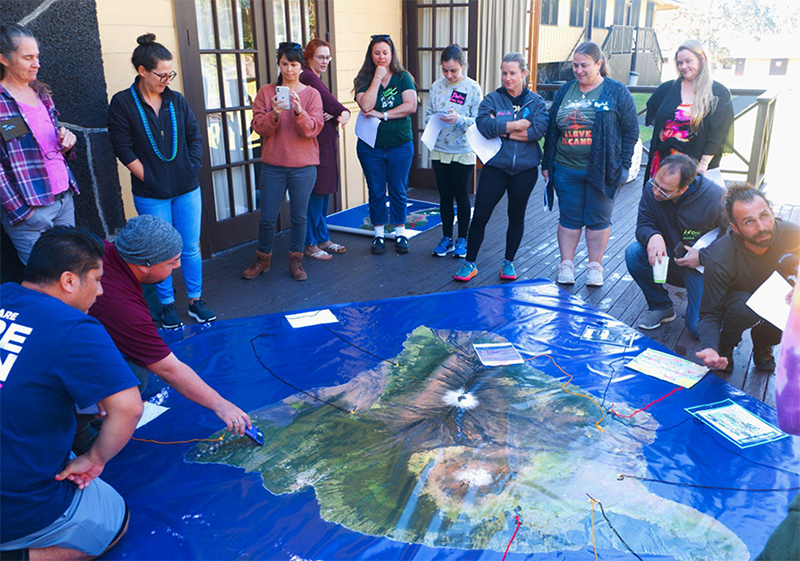
Through a growing partnership with the National Oceanic and Atmospheric Administration (NOAA), National Aeronautics and Space Administration (NASA), National Park Service (NPS), United States Geological Survey (USGS), and other community partners, educators from Maui, O’ahu, Molokaʻi, and Hawaiʻi gathered to develop place-based climate science curricula during a three-day workshop in March 2024. Participants analyzed regional climate data, connected with local research partners, and built frameworks for place-based education programs. The workshop provided teachers with grant-writing tools and scientific resources that connect Native Hawaiian environmental heritage with current climate research, enabling teachers to bring real-world data into their classrooms. Read more about the Earth to Sky.
February: Local Ecological Knowledge (LEK) Lesson Commences

PI-CASC education coordinators partnered with the National CASC Diverse Knowledge Systems Fellow, Danielle Bartz, to create a citizen science curriculum focused on local ecological knowledge (LEK). The lesson highlights Dani’s story of using community experiences to investigate declining hammerhead pup numbers to introduce students to the value of kilo, or observation, and local knowledge. Students will learn data collection and analysis methods while discussing ways to contribute to ongoing research about environmental changes. The project demonstrates the value of community experiences, observations, and knowledge in scientific inquiry. The lesson is still being developed and will be published in Spring 2025.
March: Graduate Scholar Symposium at Hawaiʻi Climate Week
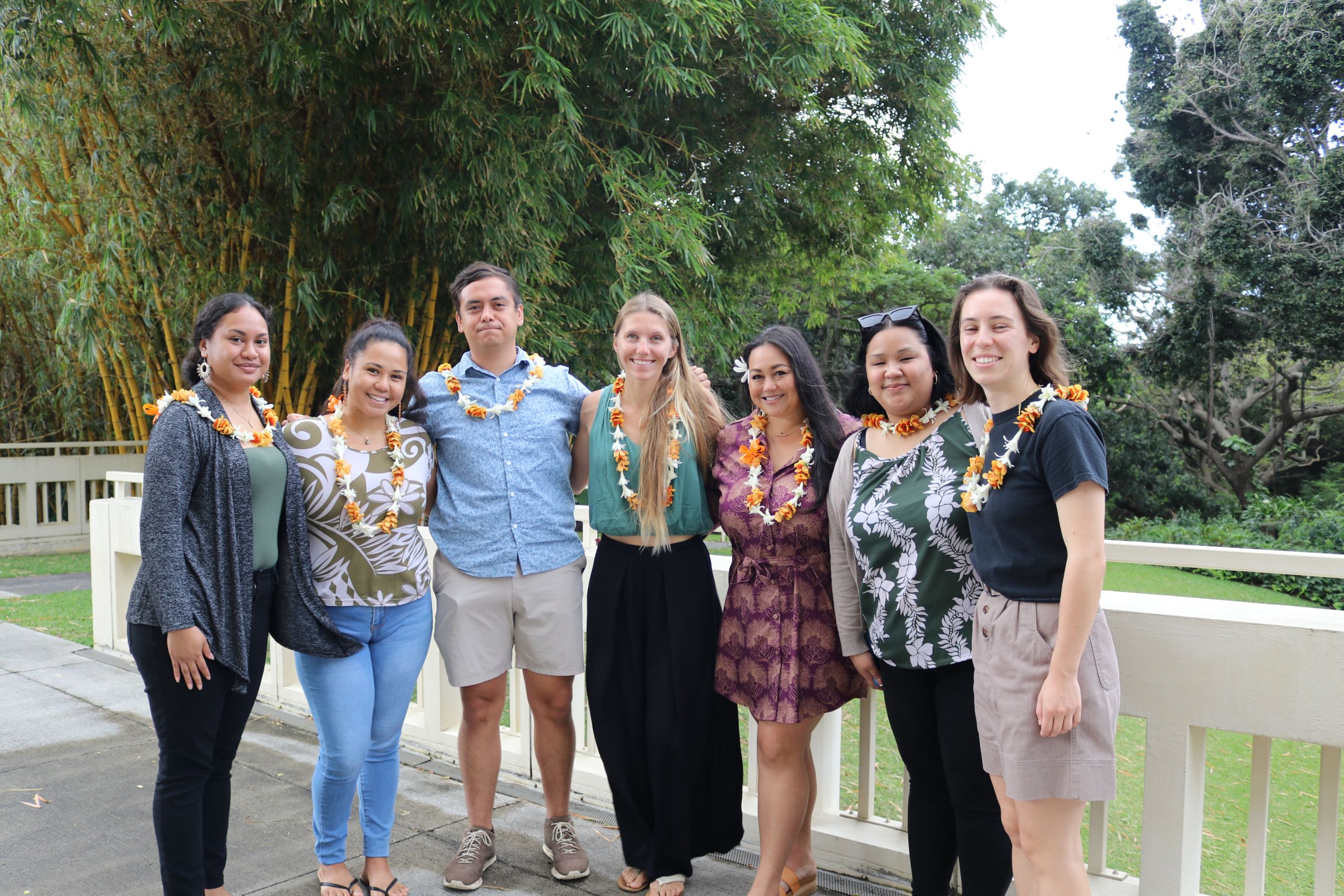
Graduate researchers presented climate adaptation studies at PI-CASC’s symposium during Hawaiʻi Climate Week. Students shared findings on sea-level rise impacts on water infrastructure, oral histories of Marshallese and Yapese voyaging for sustainable sea transport, and data-driven forest restoration methods. The presentations connected research from multiple Hawaiʻi institutions with resource managers and climate adaptation practitioners, creating direct pathways for emerging student scientists to inform local climate adaptation strategies. Read more about Hawaiʻi Climate Week and the Graduate Symposium.
April: Kona Sustainability Summit
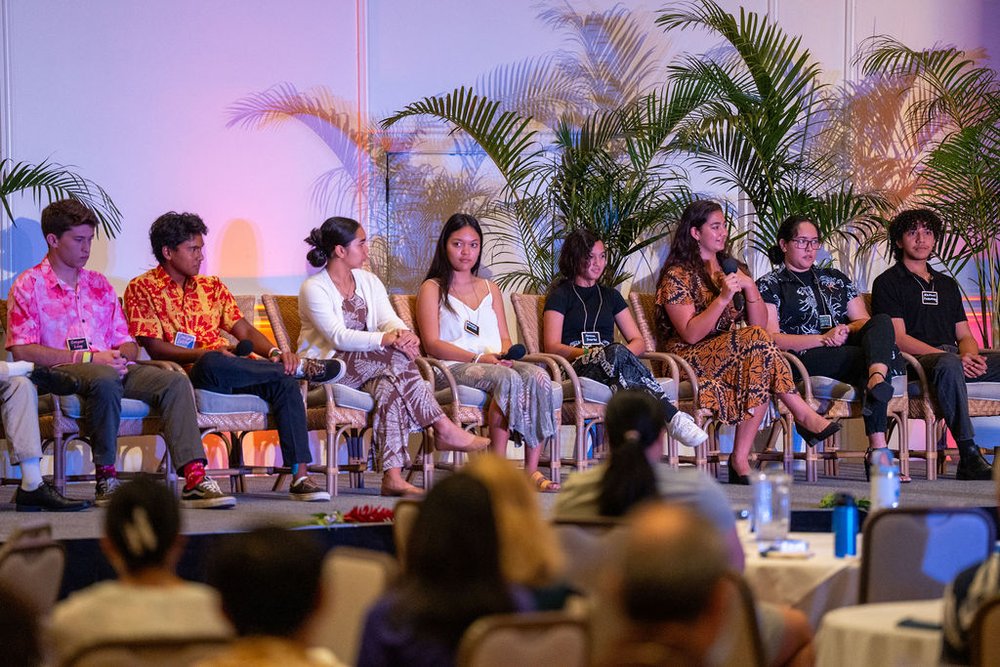
PI-CASC staff connected with Hawaiʻi educators and policymakers at the Kona Sustainability Summit to strengthen climate education initiatives. High school students presented ideas for education-focused climate adaptation policies, and teachers identified resources required to support climate science learning in the classroom better. Former Mayor Mitch Roth joined discussions on integrating climate policy into classroom learning. The summit established new partnerships between researchers, educators, and local government to support climate literacy in Hawaiʻi schools.
May: Online Interactive Lessons and Teacher Workshop
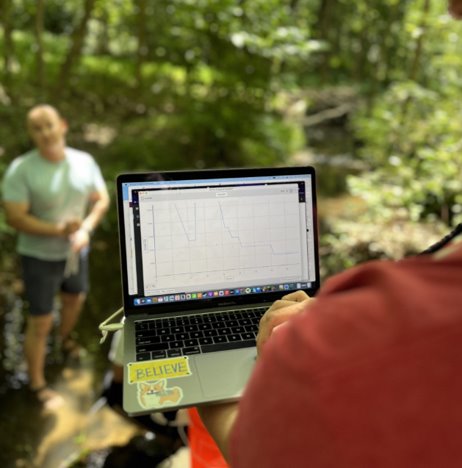
June: Updates to the K-12 Education Hub
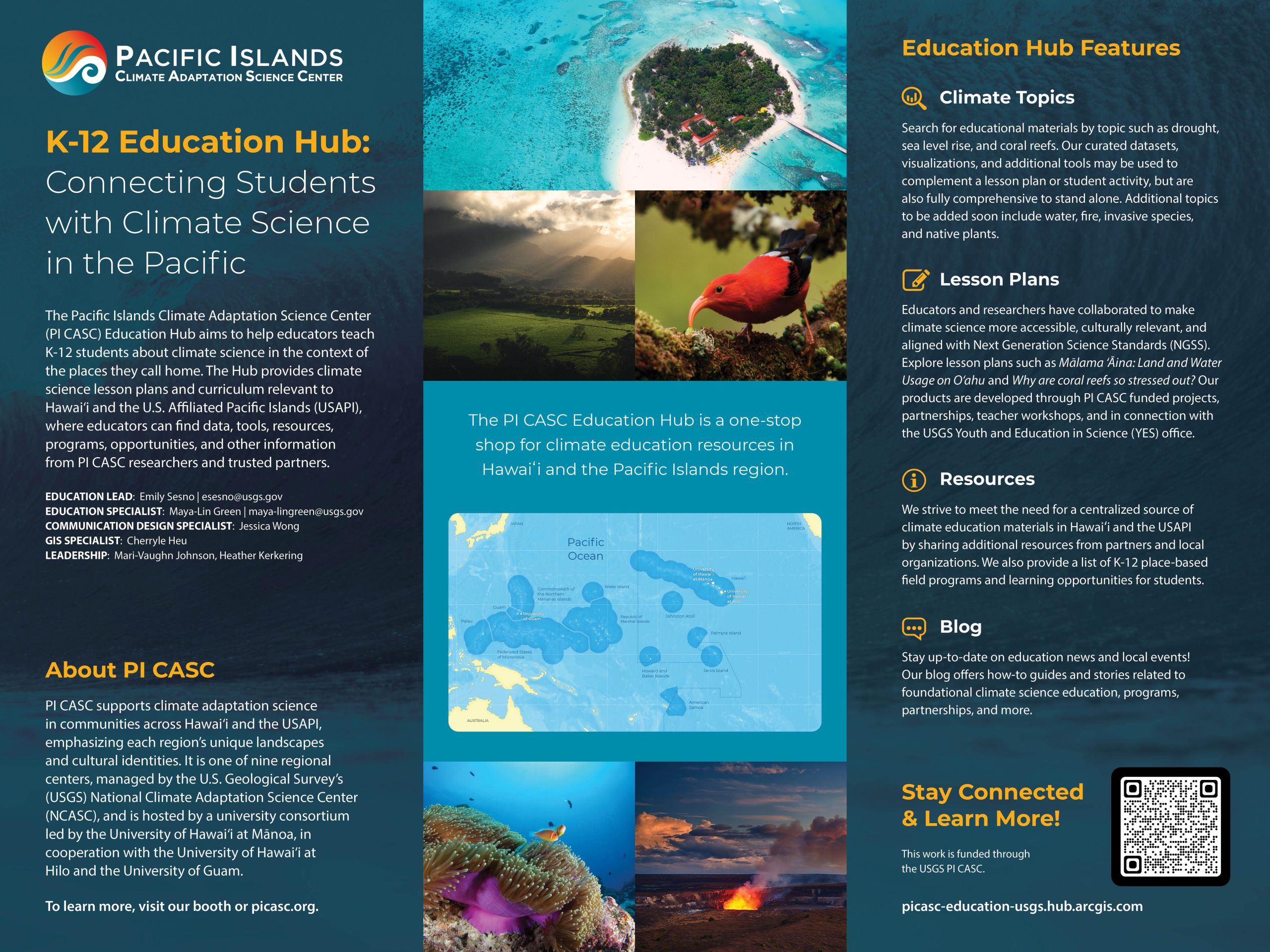
July: Bridging Connectivity with Guam Educators
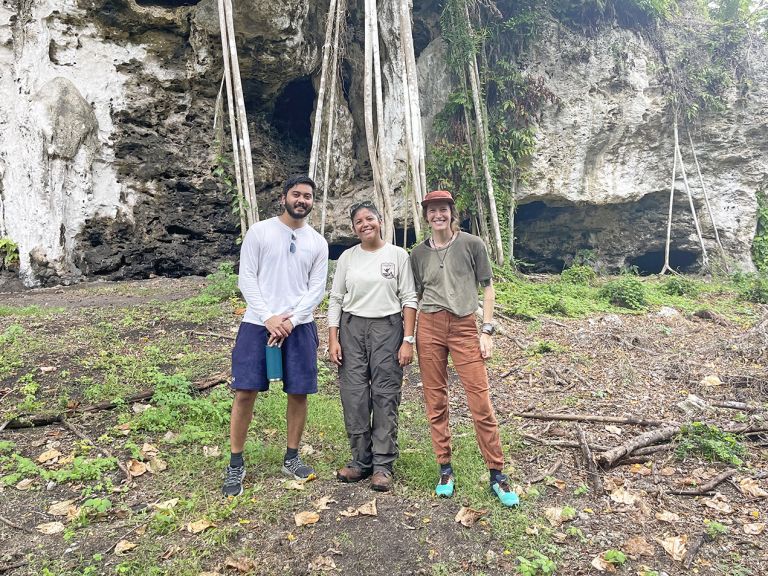
PI-CASC connected with educators in Guam during a weeklong intensive, which included a workshop, an educator-focused field trip, and a youth outreach event investigating corals. At the start of the week, PI-CASC team members John Borja and Emily Sesno ran a session during the Guam Department of Education’s Summer Academy to better understand educators’ needs and challenges when bringing relevant climate science into Guam classrooms. PI-CASC supported fellow Marybelle Quinata, who led an exploration into the Guam National Wildlife Refuge and her PI-CASC project. A bonus event allowed PI-CASC to participate in the NASA Guam Space Grant’s STEM Saturday outreach event, which taught students ages 6-10 about the importance of coral reefs and some of the challenges facing corals today. This workshop aimed to recruit interested educators to work with PI-CASC, researchers, and resource managers to create classroom materials that reflect Guam’s unique ecosystems, environmental challenges, and research priorities. Read more about the week’s events here.
July: Hawaiʻi Conservation Conference
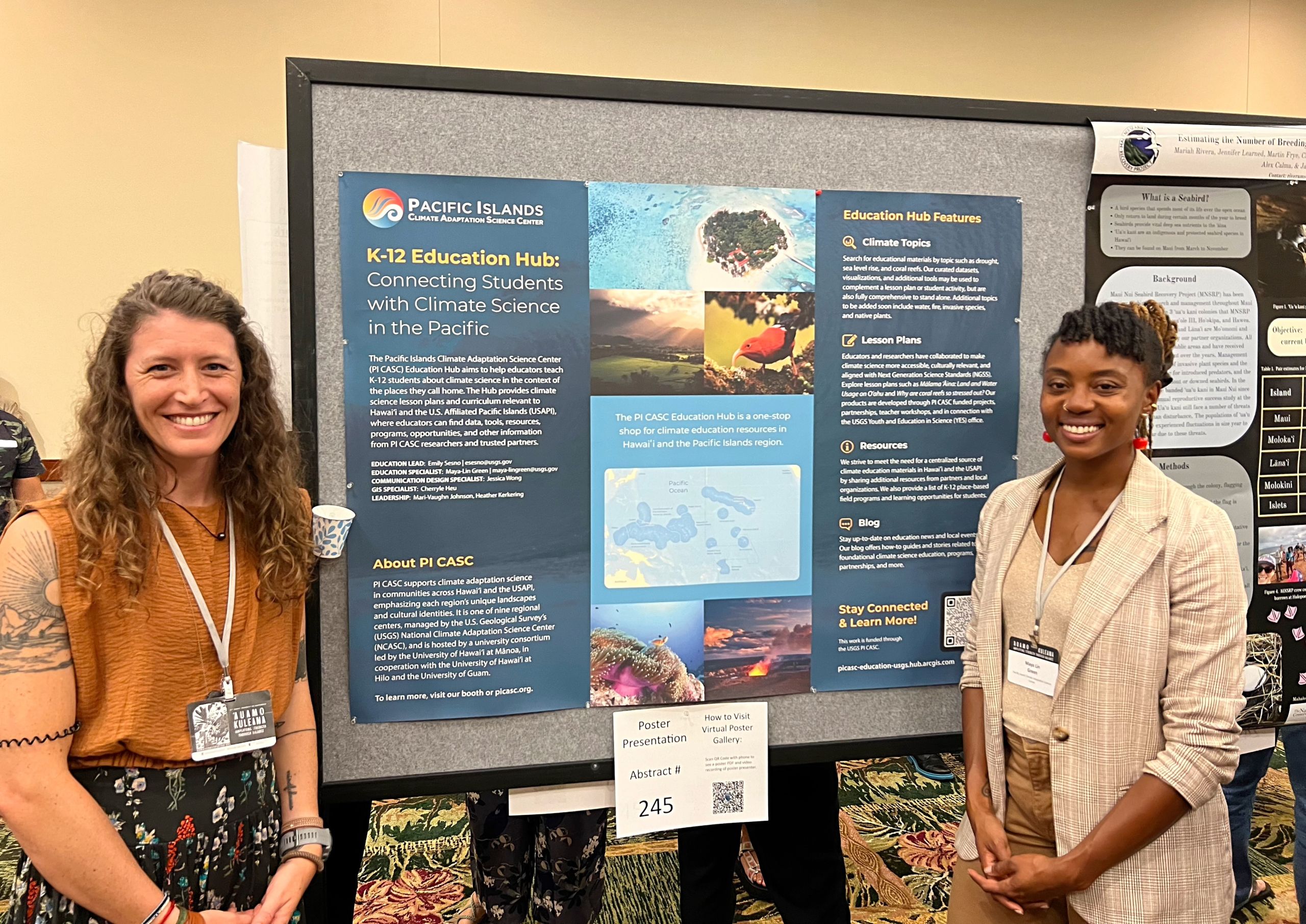
PI-CASC researchers shared their climate adaptation findings at the Hawaiʻi Conservation Conference (HCC) in Honolulu, including new developments in K-12 climate education programs. Over fifteen PI-CASC principal investigators presented their work, demonstrating how research translates into actionable science around Hawaiʻi State. The education team’s poster highlighted successful partnerships and available lessons and resources. These presentations strengthen connections between Hawaiʻi’s research community and educators to break down silos and open pathways for communication and innovation. Learn more about PI-CASC and HCC.
August: Hilo Youth Commission
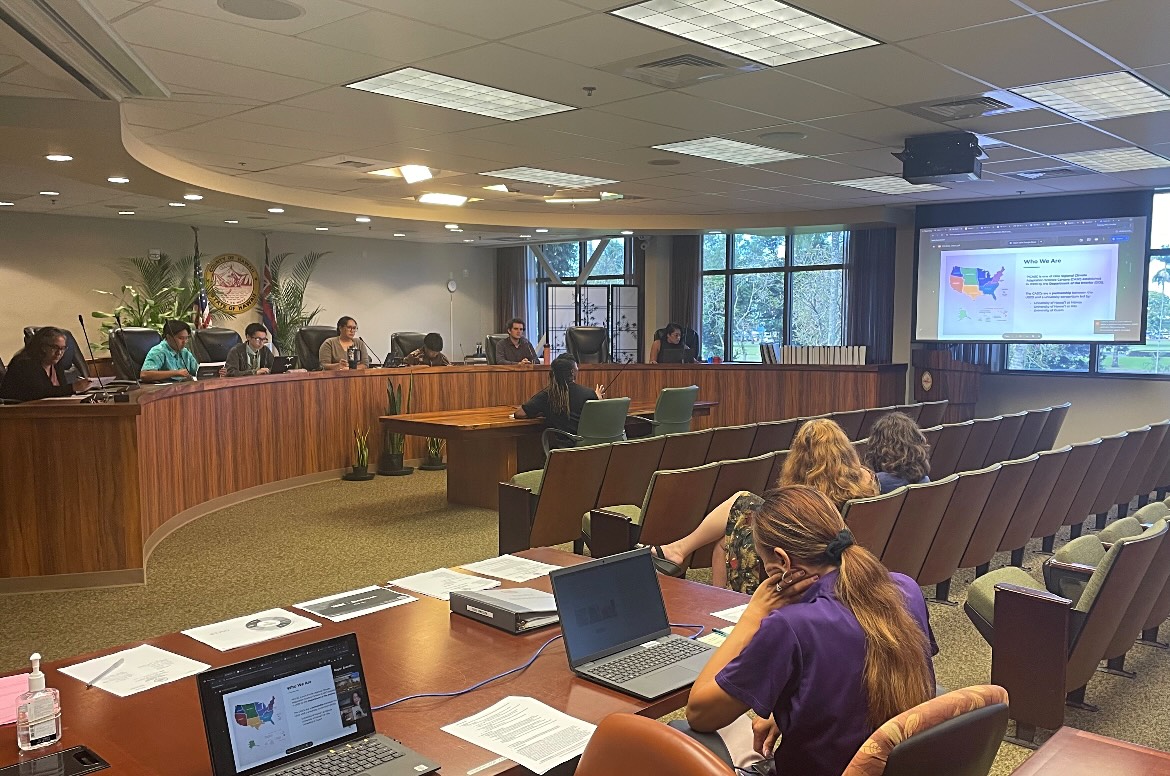
PI-CASC communication and education research fellow Maya-Lin Green gathered student feedback on climate education needs during the Hilo Youth Commission (HYC) meeting at the Hawaiʻi County office in Hilo. Students of the Youth Commission shared their formal climate adaptation learning experiences and identified gaps in environmental education resources. The commission meeting provided direct student input for PI-CASC’s K-12 educational programming. This collaboration between PI-CASC and HYC ensures climate education resources meet actual classroom needs while strengthening county-level partnerships.
September: Coral Lessons with Ka ’Umeke
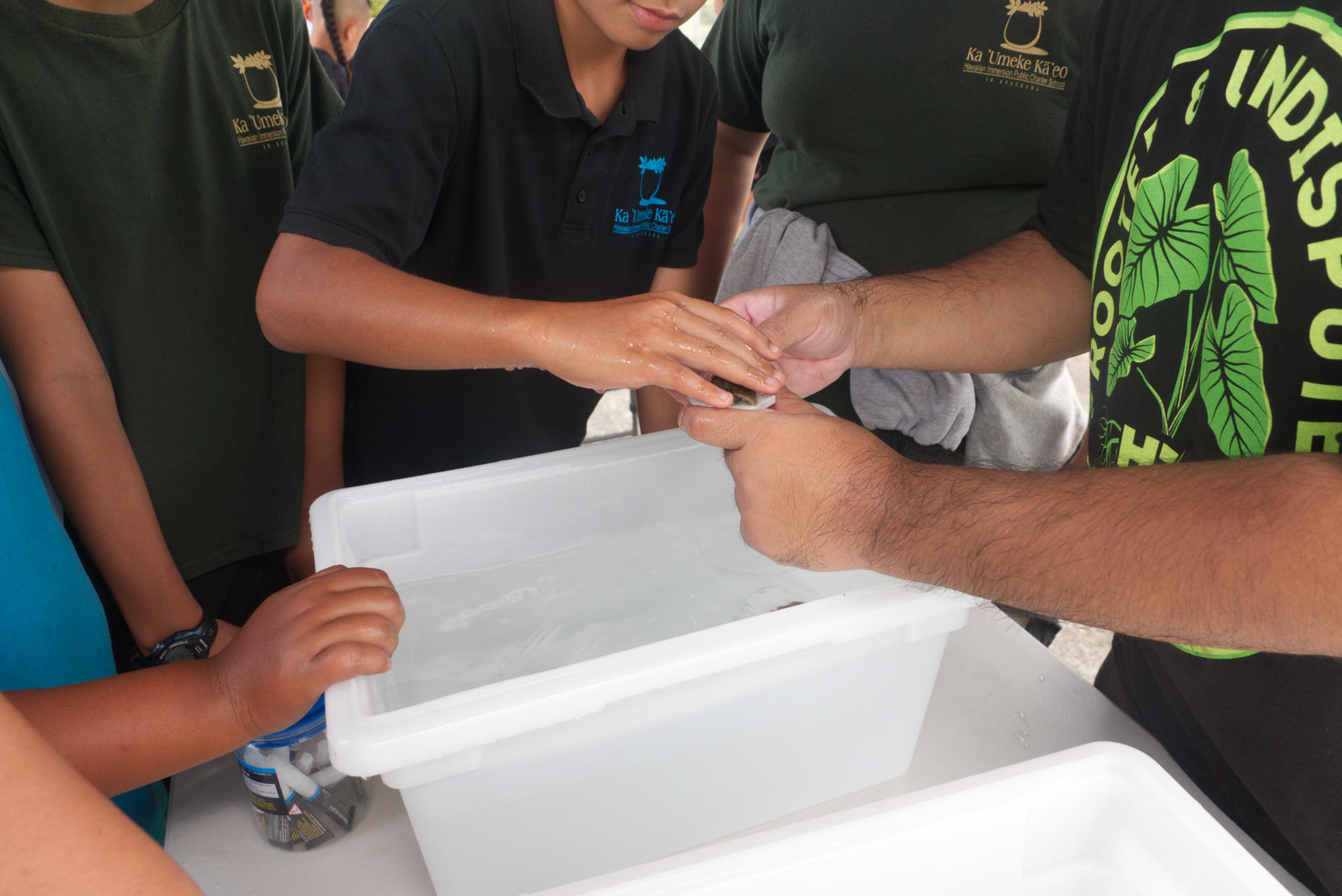
PI-CASC’s education team partnered with UH Hilo marine biologist, Dr. Steve Doo, to teach Ka ʻUmeke fifth graders about coral biology at the Pacific Aquaculture and Coastal Resources Center. Students engaged with coral research through hands-on activities led by three university student interns. The collaboration demonstrates how research labs can effectively share their work with local elementary students. This partnership directly connects Hawaiʻi’s marine science research and classroom education. Lessons learned and resources from this initiative will be shared for other educators to use in their classrooms in the coming months. Read more about this activity.
October: PI-CASC at HaSTA
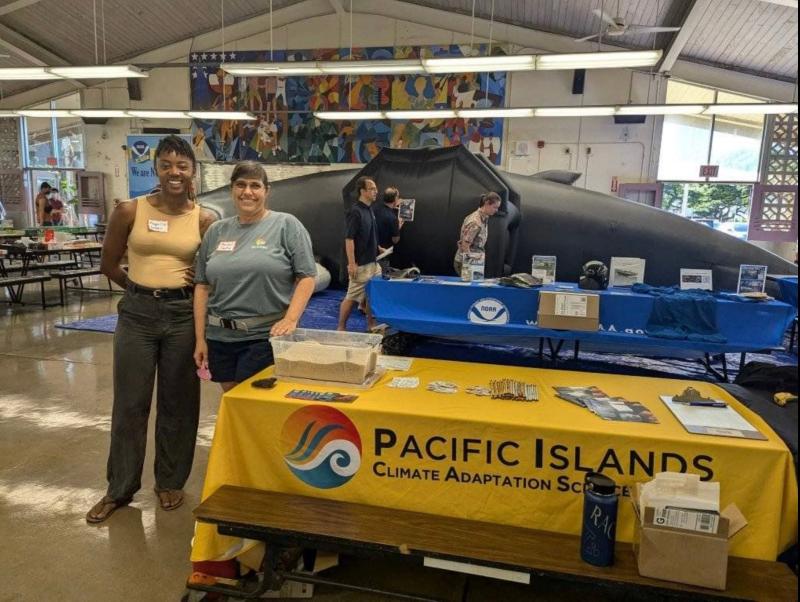
PI-CASC joined conservation agencies at the Hawaiʻi Science Teachers Association Fall conference to share groundwater education resources with local educators. Education coordinators Maya-Lin Green and Rachel Lentz collaborated with NOAA, the Hawaiʻi Climate Change Commission, the Oʻahu Invasive Species Committee, and STEM Pre-Academy to present tools and resources. The conference promoted a direct connection between research organizations, teachers, and students seeking environmental science materials. This multi-agency presence strengthens Hawaiʻi’s network of climate education providers. Read more about the HaSTA conference on the Education Blog.
November: PI-CASC Regional Administrator Presents at UH Hilo
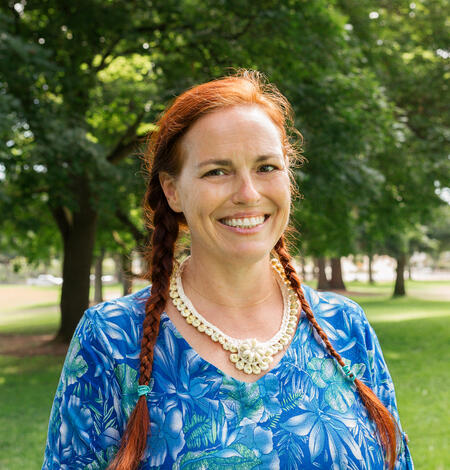
LOOKING AHEAD TO 2025
Second Educator Workshop with Online Interactive Lessons – PI-CASC and NOAA are in discussions to develop Hawaiʻi-specific data visualization tools, building on successful pilot testing from the Reston workshop.
Hawaiʻi County and Hawaiʻi Green Growth Partnership – PI-CASC will launch a campaign focusing on native plant conservation and invasive species management, including planned classroom resources and a student art competition.
Subject to Climate Partnership – Initial planning begins for a Hawaiʻi Hui collaboration between PI-CASC and Subject to Climate, which may include teacher workshops and new educational resources.
National Park Service, Guam – In response to community input, PI-CASC is developing plans with Guam’s National Park Service to create region-specific climate education resources for families.
PI-CASC’s 2024 education and capacity-building initiatives connected climate research with educators and students across Hawaiʻi and the Pacific. Across backdrops of scenic islands, students and informal and formal educators gathered through workshops and engaged with digital tools, current climate data, and place-based teaching resources. When all come together, climate science takes root in ways that honor both data and place. So much was accomplished in 2024, and more will come in 2025.
Are you a teacher or informal educator interested in connecting your classrooms with place-based climate science in the Pacific Region? Are you a scientist or an organization looking to collaborate? Contact us on our Education Hub to subscribe to our Newsletter and learn more.

